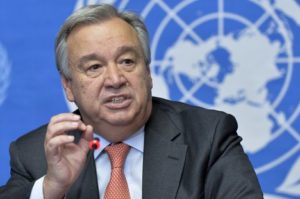Special to WorldTribune.com
UNITED NATIONS — White smoke has emerged from the Security Council, where the powerful fifteen member body, has selected a new UN Secretary General from among a dozen declared candidates.
Intense diplomatic deliberations among the powers, hectic lobbying among the candidates, and rife speculation in the international community came to a surprisingly quick conclusion with a unanimous vote electing a respected former Portuguese Prime Minister to head the 193-member organization.

Antonio Guterres, (67) who was until recently chief of the UN Refugee Agency (UNHCR) was elected to become the UN’s new Secretary General. Ending a year of intense behind the scenes politicking, more than a dozen candidates, and an unwritten pledge that the next Secretary General should be a woman from Eastern Europe, nonetheless in the end Guterres got the nod from the Security Council.
The election of the Secretary General, or more precisely the selection, emerged after the Security Council held a number of unofficial “straw ballots” to assess the strengths and weaknesses of a plethora of candidates. Antonio Guterres who consistently polled first in six “straw polls” was a clear favorite from the start, but still faced a possible veto from the Russians.
Over the past six months in a move for overdue transparency, the various candidates were publicly vetted through speeches and town hall type settings. Some contenders such as Bulgaria’s once favorite Irina Bokova or Slovenia’s Daniel Turk failed to get serious traction. Helen Clark of New Zealand, the choice of many insiders, never seriously got off the ground.
Yet, from the start Antonio Guterres cut an impressive policy swath combining a sense of competence, confidence and charisma in his audition for the UN’s top job.
Early in the process a number of European Ambassadors told this writer, “You must hear Guterres. He is the best so far.”
Britain’s Ambassador Matthew Rycroft said that Antonio Guterres “will take the United Nations to the next level in terms of leadership” and furthermore be “a moral authority at a time when the world is divided on issues.” Ah, classic understatement!
So as the two term tenure of South Korea’s Ban Ki-moon comes to an end, what does Antonio
Guterres really inherit?
Antonio Guterres is an electrical engineer by profession but later went into politics an subsequently become Portugal’s Prime Minister between 1995-2002. A member of the Socialist party (though from its more moderate wing), his tenure was marked with close relations to the European Union (EU) and the USA. Later he would serve as the chief of the Geneva-based UN High Commissioner for Refugees (UNHCR) a post which gave him the jarring personal experience in dealing with the world’s expanding refugee crisis.
Given that the world is facing the largest refugee crisis since the end of WWII, with more than 65 million fleeing their homelands, it may be fitting and indeed wise to select a candidate who has distinguished himself over a decade in humanitarian efforts to help the displaced. As I often say, the UN has done an admirable job in treating the staggering humanitarian symptoms of global crises but has failed to solve the actual problems causing the refugee flows. Syria, Libya and Afghanistan come to mind.
The UN system is confronted by a world in crisis; humanitarian missions, the spread of ethnic/religious conflict, widening peacekeeping mandates, and trying to break the rigid diplomatic logjam in the Security Council are but a few of the challenges.
More distressing remains the Crisis overload from a plethora of failed states and dystopian regimes which have created a humanitarian tsunami facing any new Secretary General.
May I mention a few names? Afghanistan, Congo, Central African Republic, Libya, Syria, Somalia, Sudan, Yemen. Then there’s North Korea’s nuclear weapons.
As a longstanding member of NATO and the European Union, Portugal, and Guterres by extension had the support of Britain, France and later the USA. He was apparently able to cajole both Russia and China from using their vetoes to block his candidacy, though one expects him to appoint a Deputy Secretary General of Moscow’s liking from Eastern Europe to close the deal.
Was there a wider quid pro quo for Russia’s sudden turnaround?
Speaking from Lisbon, Antonio Guterres said, “I have two words to describe what I’m feeling now, gratitude and humility.” Given the huge tasks which confront him when he takes office in January, he’ll need his impressive experience and big dose of good luck too.
John J. Metzler is a United Nations correspondent covering diplomatic and defense issues. He is the author of Divided Dynamism the Diplomacy of Separated Nations: Germany, Korea, China (2014). [See pre-2011 Archives]

